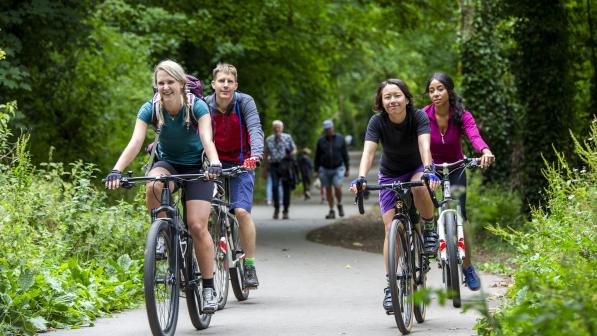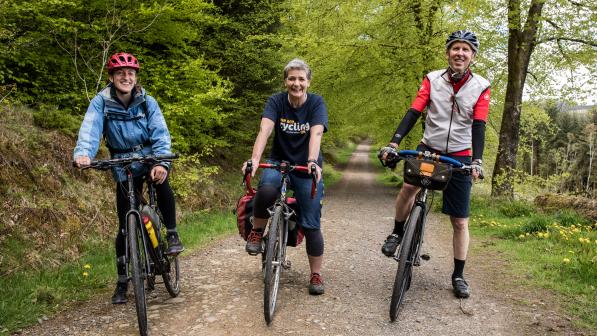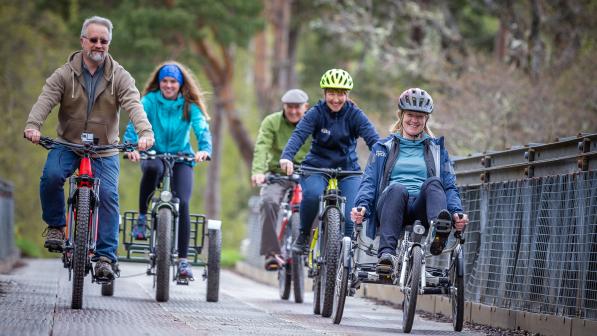Opinion: Sarah Mitchell's New Year look ahead

To start with cycling was a way of saving money for me – as a teenager I saved up my bus fare to buy complicated jewellery and incense; when I started work the bike was a cheaper option than a car or even public transport. Even now, although I can and do drive, I baulk at the cost of owning and running a car compared with my trusty old bike.
This year it seems like many other people may have come to the same conclusion. Since the price of fuel increased last spring, figures released by the Department for Transport show cycling levels during the working week have surged. It doesn’t feel like too much of a leap to believe that these two facts are connected.
As the costs of running a car rise – including purchase price, insurance, fuel, parking, congestion charging etc, etc – the price of other necessities in our lives is also increasing each month. Against this backdrop, the relative cost and many benefits of cycling are more appealing than ever.
Bikes, even e-bikes, cost much less to buy than a car, have no fuel costs (they burn calories not carbon) and low maintenance costs
Sarah Mitchell, Cycling UK chief executive
Looking after your bike has never been easier with Cycling UK’s helpful, cost free videos, advice and courses to help you tackle the basics. Even if, like me, you are rubbish at bike repairs, the cost of a regular service and support from your local bike shop is a fraction of the price of that of a car.
And for many people, swapping a car for a bike is a real possibility as almost one third of drivers also cycle and 71% of our journeys are less than five miles – a distance that many us of would be able to cycle instead.
At Cycling UK we calculated just how much money you could save by swapping a second car for an e-cycle: In the first year you could save £18,729.09 and in subsequent years an average of £723.09. This represents a massive and welcome potential cost-saving for households.
At Cycling UK our mission is to get millions more people cycling and we have spent years understanding how to help people from all backgrounds switch to cycling. Our behaviour change projects now have robust evidence about what works and in the last year our Big Bike Revival programme worked with more than 80,000 people and saw one third of those taking part replace car journeys with cycling.
The Big Bike Revival project tackles the practical challenges to taking up cycling and helps people to make cycling a practical option in their lives. Its three elements include fixing up old bikes, teaching or refreshing rusty cycling skills to be safe on the road, and setting up local social cycling groups. We work with community organisations in areas of England where cycling levels are low and households could particularly benefit from the cost savings and health impacts or regular cycling.
The learnings from Big ike Revival are based in behavioural science and applicable in a wide range of contexts, leading us to be confident that, with the right support and context, many many more people could save money and improve their health by taking up cycling.
Looking ahead to 2023 we anticipate another year of economic volatility and high prices putting pressure on households’ purses. We also expect a further increase in commuting, as more people drift back into office-based working for at least part of the week.
There are real reasons to feel optimistic. Active Travel England is starting to set quality standards for cycling infrastructure and investment across local authorities. While this won’t make a difference overnight, in due course we can expect cycling in built-up areas to feel safer on segregated and better-designed routes. Similarly the increase in cycling levels is an opportunity for us to build on and enable more people to tackle the cost of living by replacing shorter car journeys with cycle rides.
Scotland, as has so often been the case in recent years, could be the shining example of the home nations next year. As an early Christmas present, the Scottish Government’s budget for 2023/4 revealed a record amount of funding for active travel of at least £189.2m according to Cycling UK calculations.
In Wales, positive change is also afoot. Llwybr Newydd, the government’s new transport strategy published in 2022 revolves around the goals of the Well-being of Future Generations (Wales) Act 2015, the climate emergency and grapples with the need for fewer cars on our roads, as well as more people using public transport, walking or cycling. While the mechanics of delivering the shift towards active travel still needs working on, there is little to fault the direction and intention of Wales’ government.
Sadly, the same cannot be said for cycling in Northern Ireland. Bereft of a working government, and with the Department for Infrastructure barely paying lip-service to the country’s cycling needs, satisfaction in Northern Ireland’s cycling facilities has dropped again. New years are for renewed positivity, and Cycling UK will work to reverse the decline over the coming year.
Combined, these elements point to a big opportunity for cycling, as 2023 looks to hold both push factors - pushing people away from cars - and pull factors, increasing the appeal of cycling.
This is important for all of us, because increasing cycling and reducing car use has a positive impact on us all. For those opting to use their bikes there is the clear cost saving, added to that there are the proven health benefits of cycling – both physical and mental. Less recognised though are the advantages for everyone else, even non-cyclists: fewer shorter car journeys means less traffic, an environmental and health benefit for all of us, higher levels of activity amongst more people means better health outcomes which saves the NHS (and all of us) money in the long run.
To find out more about how you can help us to make a better world by bike in 2023 join Cycling UK, keep in touch through our weekly Cycle Clips and support our award-winning cycle campaigning.




